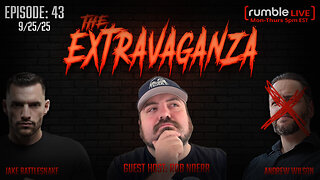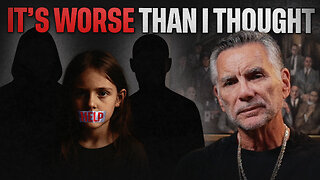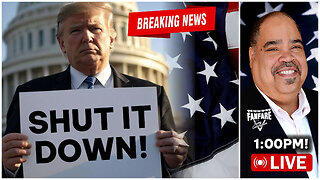Premium Only Content

Episode 3196: The Beheading of St. John the Baptist Yesterday and Today
www.catholic-reboot.com
Nightly Zoom Coordinates for Rosary:
Meeting ID: 865 8978 0399
Passcode: Wjjv4960!
Speak Lord for your Servant is Listening
Book Recommendation of the Day
Hippolytus’s Philosophoumena (also known as Refutation of All Heresies)
This early 3rd-century polemical work is arguably the most significant primary source describing Zephyrinus. It portrays him (and his successor Callixtus) as entangled in doctrinal controversy, particularly over Monarchianism or Modalism which emphasized God's absolute unity and was at odds with emerging Trinitarian theology
You may listen to my podcasts and say “We get it Wal, lets move on”. Well redundancy at times is a great educational tool. That’s how we learned our faith. You need to repeat certain things before they sink in. Remember how they changed our church by constant repetition as we were growing up in the late 60’s and 70’s. After a while people start believing error is truth. Well in order to return to the truth at times we need to be repetitive.
Side note. Last night I was asked to step in at the last minute to sing for two acts that cancelled at an parish event raising money for Catholic Teenagers wanting to travel to a Catholic youth event. The opening group was the parish’s Hispanic church choir. I was floored. I came to find out what they were performing was exactly what they do at their Hispanic mass on Sunday. You would have thought you were attending a penecostal revival with all the dancing and singing and guitars and drums. A visiting Priest was there and I asked him is this what they do in Church and he rolled his eyes and said “Sadly Yes”. I said and the pastor allows it? He didn’t comment. I said Father since this is an outside event I am not performing any religious songs. He replied “Good because that’s what it is suppose to be. Sing Away”.
But what I want to speak about in todays episode is how did we go from Then “All things in Christ” to Now “Is Everybody Happy?”
Then vs. Now: Tradition and the Modern Crisis of the Church”
The contrast between the Catholic Church before Vatican II and the Church in our modern era.
We will not speak from nostalgia, but from fidelity. The saints, the councils, the popes before Vatican II handed down a faith that was clear, reverent, and doctrinally united. Today, however, the faithful are often confronted with ambiguity, desacralization, and doctrinal chaos.
To make this point clear, let us look at specific examples asking questions that highlight the radical difference between then and now.
Bishops Blessing Same-Sex Unions
Then: Before Vatican II, the Church’s teaching on marriage was unmistakable: it is a sacrament, instituted by Christ, between one man and one woman, indissoluble until death. Popes like Leo XIII (in Arcanum Divinae) and Pius XI (in Casti Connubii) defended the sacrament of Matrimony with clarity. Homosexual acts were universally condemned as grave sins against nature and against God.
Now: Today, in Germany and elsewhere, bishops publicly bless same-sex unions, claiming to “pastorally accompany” souls while in reality ratifying sin. Instead of defending doctrine, Rome often remains silent or worse, praises such actions as “synodal dialogue.”
Traditional Catholic Commentary:
• St. Paul is clear in Romans 1:26–27: men abandoned natural relations and burned with lust for one another, and “those who practice such things are worthy of death.”
• What was condemned by the Apostles cannot now be blessed by bishops.
• The pre-Vatican II Church acted as guardian of marriage. The post-Vatican II Church often acts as its betrayer.
Application:
The faithful must reject false shepherds who normalize sin and hold fast to the perennial teaching of Christ. True pastoral care is to call souls to repentance, not to confirm them in error.
The Pope Praying in Mosques and Synagogues
Then: Before Vatican II, the Church proclaimed with authority: “Outside the Church there is no salvation” (Extra Ecclesiam nulla salus). Missionary saints like St. Francis Xavier and St. Isaac Jogues gave their lives to bring souls into the one true Church. No pope or bishop would have dared enter a mosque or synagogue as if we shared an equal path to God.
Now: Since Vatican II, especially after the Assisi gatherings under John Paul II, it has become common for popes to pray in mosques and synagogues. These acts, presented as gestures of “fraternity,” send the implicit message that all religions are valid paths to God. The unique mediation of Christ is eclipsed.
Traditional Catholic Commentary:
• Our Lord said in John 14:6, “I am the Way, the Truth, and the Life. No one comes to the Father except through Me.”
• The First Commandment forbids offering worship or prayer in false religions.
• Pope Pius XI in Mortalium Animos (1928) explicitly condemned false ecumenism, warning that it would lead Catholics to abandon the truth.
Application:
We must resist the false notion that Catholicism is merely one option among many. Out of true charity, we must hold that Christ and His Church alone possess the fullness of salvation.
Sunday Mass: From Obligation to Option
Then: Before Vatican II, Sunday Mass was understood as the absolute duty of every Catholic soul. The Baltimore Catechism taught clearly: to miss Sunday Mass without grave reason was a mortal sin. Churches were packed, confessionals were full, and the sense of reverence was profound.
Now: In the modern era, Sunday Mass is often treated as optional. Parishes close from lack of attendance, and many Catholics feel no obligation. Surveys show that most Catholics today do not even believe in the Real Presence of Christ in the Eucharist. This collapse coincides with the Novus Ordo liturgy, which emphasizes the community over sacrifice, reducing the Mass to a gathering rather than Calvary made present.
Traditional Catholic Commentary:
• The Third Commandment: “Remember to keep holy the Lord’s Day.”
• Hebrews 10:25: “Do not neglect to meet together, as is the habit of some.”
• St. Padre Pio called the world without the Mass a world doomed to destruction.
Application:
Catholics today must recover a sense of obligation and love for the Holy Sacrifice of the Mass preferably by returning to the Traditional Latin Mass, where reverence and doctrine are unmistakable.
Then vs. Now – The Stark Contrast
The contrast is stark:
• Then: Clarity, reverence, doctrinal unity.
• Now: Ambiguity, desacralization, doctrinal chaos.
The pre-Vatican II Church guarded the Deposit of Faith as a treasure. The post-Vatican II Church often appears to treat it as a burden something to adapt, reinterpret, or set aside to please the world.
But remember: the Faith itself has not changed. Christ has not changed. The Deposit of Faith remains. What has changed is the willingness of leaders to proclaim it without compromise.
Closing Exhortation
We must not lose hope. God always preserves a faithful remnant. The blood of martyrs, the prayers of saints, and the fidelity of Tradition remain alive.
Our task is to:
• Cling to Tradition. Study the Catechism of Trent. Attend the Traditional Latin Mass if possible.
• Teach the Faith clearly. Parents and grandparents must pass on what many priests and bishops no longer teach.
• Defend the truth with charity. Like St. Paul, we speak boldly: “By the grace of God, I am what I am.”
Let us not conform to the errors of our age, but be transformed by fidelity to Christ, who is the same yesterday, today, and forever.
“Holding Fast to the Faith: St. Paul, the Healing Word, and St. Zephyrinus”
Today’s readings remind us of two central truths: that our faith is founded on the Resurrection of Christ, handed down faithfully from the Apostles, and that Christ alone opens our ears to hear His Word and our tongues to proclaim it rightly. These lessons are deeply fitting as we honor St. Zephyrinus, who defended the purity of the faith against false teachers.
Epistle – 1 Corinthians 15:1–10
St. Paul reminds the Corinthians of the Gospel he received and preached: that Christ died, was buried, and rose again on the third day, appearing to many witnesses. He humbly admits his unworthiness as one who once persecuted the Church, but he boldly declares: “By the grace of God, I am what I am; and His grace in me hath not been void.”
Reflection on the Epistle
Here, St. Paul highlights three pillars of Catholic faith:
1. Tradition received and handed on The Gospel is not man-made; it is divine revelation faithfully preserved.
2. The centrality of the Resurrection – The entire Christian faith hinges on Christ’s rising from the dead.
3. The power of grace – Paul is living proof that grace can transform even the worst sinner into a saint.
This passage calls us to humility and fidelity. Like Paul, we too are unworthy, but grace transforms us. And like Paul, we are called to hold fast to the Gospel as it was given, without compromise or corruption.
Gospel – Mark 7:31–37
Jesus heals a man who was deaf and mute. Taking him aside, He touches the man’s ears and tongue and commands, “Ephpheta—that is, Be opened.” Immediately, the man’s ears were opened and his tongue loosed, and he spoke rightly.
Reflection on the Gospel
This miracle is a symbol of our spiritual lives. Without grace, our ears are deaf to God’s Word and our tongues tied when it comes to proclaiming His truth. Christ alone opens our ears and loosens our speech.
This Gospel is echoed in the baptismal rite, where the priest prays the Ephpheta prayer: that the newly baptized may hear the Word of God and profess it with their lips.
For us today, it is a reminder that fidelity to Christ requires two things:
• Ears open to Tradition – rejecting the false voices of modernism.
• Tongues loosed in proclamation – boldly speaking the truth, even when unpopular.
Feast of Pope St. Zephyrinus
St. Zephyrinus reigned as pope from A.D. 199 to 217, during fierce Roman persecution. He also faced heresies within the Church, especially against the divinity of Christ. Though unlearned, he was a man of deep faith, strengthened by the support of his deacon, St. Callistus.
Zephyrinus was mocked by some for his simplicity, but he never compromised on the central dogma of Christ’s true divinity and humanity. In this, he reflects today’s readings perfectly: like St. Paul, he relied not on his own strength but on grace; like the healed man, he spoke rightly the truth entrusted to him by Christ.
Application for Today
• Cling to Tradition: As St. Paul taught, the faith we received must be handed on intact—unchanged, unwatered down.
• Trust grace, not self: Like Paul and Zephyrinus, confess our unworthiness but rely on God’s transforming grace.
• Be opened: Pray daily that Christ open our ears to hear the truth and our tongues to proclaim it, even against opposition.
• Defend the Faith: In a time of doctrinal confusion, imitate St. Zephyrinus’s courage in affirming Christ’s divinity.
Conclusionary Prayer
O Lord Jesus Christ, who didst raise up St. Paul to preach Thy Resurrection, and who didst open the ears and tongue of the deaf-mute, grant us ears to hear Thy word with fidelity and tongues to proclaim it with courage. Through the intercession of Pope St. Zephyrinus, strengthen us against heresy, error, and fear, that we may remain faithful servants until the end. Through Christ our Lord. Amen.
St. Paul, pray for us.
Pope St. Zephyrinus, pray for us.
Sacred Heart of Jesus, have mercy on us.
-
 1:03:58
1:03:58
TheCrucible
2 hours agoThe Extravaganza! EP: 43 (9/25/25)
28.6K7 -
 DVR
DVR
Kim Iversen
2 hours agoHegseth Summons Top Brass — Is War With Russia Incoming?
5.09K68 -
 1:31:41
1:31:41
Redacted News
2 hours agoNew Charlie Kirk Video Evidence Could Change EVERYTHING | Redacted w Natali & Clayton Morris
141K135 -
 22:10
22:10
Jasmin Laine
3 hours ago"You Promised Them $1BILLION!?"—Liberal Gets LAUGHED Out of Parliament
30011 -
 1:54:22
1:54:22
vivafrei
4 hours agoOstrich Farm UPDATE! And Live with Tyler Fischer Talking REAL Cancel Culture He is Experiencing!
154K27 -
 31:39
31:39
Michael Franzese
2 hours agoAmerica’s Human Trafficking Crisis EXPOSED by Former Mobster
9.4K8 -
 LIVE
LIVE
Wayne Allyn Root | WAR Zone
6 hours agoWatch LIVE: The War Zone Podcast with Wayne Allyn Root
61 watching -
 LIVE
LIVE
The Liberty Lobbyist
3 hours ago"The View From The Top: How Leadership Shapes Legislation and Responds to Activism"
76 watching -
 4:59:50
4:59:50
Barry Cunningham
6 hours agoPRESIDENT TRUMP NEEDS TO STAND FIRM AND SHUT THE GOVERNMENT DOWN IF HE HAS TO!
39K36 -
 23:45
23:45
IsaacButterfield
13 hours ago $0.41 earnedThe Rise of Autism in Gen Z
7.61K12